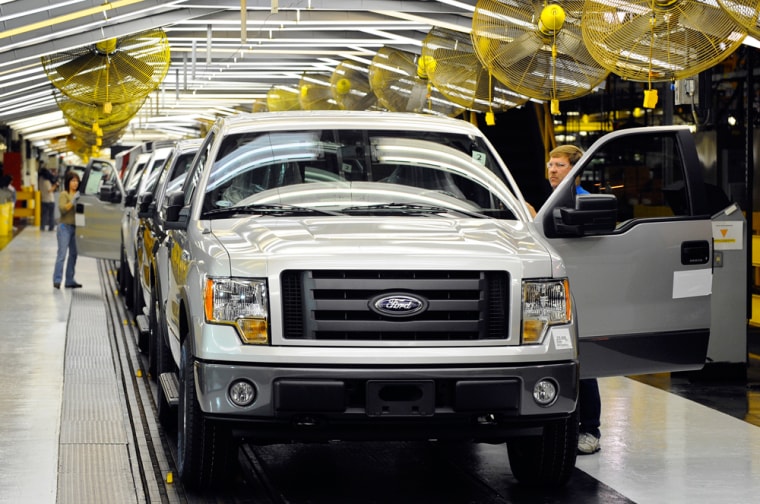The Big Three in Detroit are fighting for a piece of the bailout pie.
General Motors Corp., Chrysler LLC and Ford Motor Co. are lobbying for $25 billion from the government to help them survive the automotive industry’s worst financial crisis.
GM and Ford reported Nov. 7 that they hemorrhaged cash in the third quarter. GM, the nation’s largest automaker, said it lost $2.5 billion and also suspended talks to acquire rival Chrysler. Ford posted a $129 million loss in the third quarter and said it will eliminate another 2,260 jobs. It burned through $7.7 billion in cash.
The Senate plans to take up the cause of the distressed automakers on Monday.
Ford — perhaps more than its two domestic competitors — may be in a better position to weather the economic storm despite dire times in the automotive industry.
Ford's cash position
The Dearborn, Mich., carmaker says it has the cash to survive 2009 and reach the hoped-for economic turnaround.
There is good reason to suspect that Ford is not just whistling past the junkyard. Most immediately, Ford is not in danger of running out of money in the coming months. Two years ago, then-new Ford president and CEO Alan Mulally lined up $24 billion worth of financing, mortgaging the company’s name to build a war chest bigger than anyone thought would be needed, just in case.
That move now looks prescient, though it was primarily done because Ford ran out of money sooner than GM and Chrysler did. “In hindsight that was a very smart move by Mr. Mulally,” observed Tom Libby, senior director of industry analysis at J.D. Power and Associates. “It gives Ford an advantage financially.”
“I think Ford will be in excellent shape,” said Peter DeLorenzo, editor-in-chief of the Detroit insider Web site Autoextremist.com. “Mulally made the tough calls that the other CEOs refused to make — he understood that Ford had to get smaller before it could better — and Ford will be better positioned in the marketplace in the 2010-2011 time frame because of it.”
And to the notion that Ford was plain lucky on the timing of its loans? “Mulally may have lucked out on the financing deal, but then again you have to make your own luck in this business at times,” DeLorenzo said.
Remaking its product line
But in the longer term, Ford is building momentum as it remakes its product line into one that more closely reflects consumers’ new interests. “The main point we are trying to make to folks is that we have a plan that we want to execute,” said spokesman Mark Truby. “Our vision is to leverage the strength of Ford globally.”
That plan, which Mulally announced in 2006, is to use the well-regarded designs of its products from Europe and Asia in all markets, including the U.S. So the company is booting some of its big trucks out of U.S. factories to make room for cars like the all-new Fiesta subcompact. That car launched in Europe this year and should appear in U.S. dealers in fall of 2009. In contrast, GM’s just-announced global compact sedan, the Chevrolet Cruze, will now be delayed a year in the U.S. to help the company conserve its cash on hand.
Ford will import another small vehicle, the Transit Connect commercial minivan, giving it a fuel-efficient product to sell to urban delivery companies and small businesses. The recent plunge in gas prices highlights the danger of completely converting to small products for which Americans have so far demonstrated limited appetite, however.
“What we want to have is a balanced portfolio of vehicles,” Truby said. To that end, Ford recently announced it was recalling workers for a third shift at an assembly plant for its all-new 2009 F-150 pickup truck, It anticipates that its new design, falling gas prices and pent-up demand from commercial customers who have postponed necessary truck replacements will drive demand for its perennial best-seller.
Ford’s new F-150 appears strongly positioned to wrest sales away from the Dodge Ram based on the strength of its all-important specifications for towing and cargo-carrying.
Market expected to turn around
Chrysler’s recent woes and the very real possibility the Ram truck could be orphaned in the not-too-distant future could also steer buyers toward Ford, analysts said, because Ford, like Dodge, has a strong rural dealer network. “People are very leery about buying a Dodge truck right now,” said Joe Phillipi, president of AutoTrends Consulting.
Despite these advantages, Ford expects 2009 to be a tough year for truck sales because weakness in the housing market erodes the income of many of its truck customers who work in the building trades, explained F-150 marketing manager Doug Scott. But the market will turn around, he forecast. “We see the overall pickup business recovering to about two million units a year by around 2012,” he said. That would double today’s truck sales but would fall short of the previous high-water mark.
Paring its product line and number of brands has left Ford lean enough to survive tough times with the goal of emerging as a stronger core brand. “If you look at the industry’s best performers such as Toyota, Honda and BMW, they focus on their core brand and take care of that image,” said Truby. Ford’s goal is to similarly produce world-class products bearing the Ford name, rather than dividing its attention among many brands.
GM, in contrast, is struggling with too many brands and too many dealers. The industry’s changing conditions dictate that GM and other manufacturers must trim these excess brands, said Patrick Anderson, CEO of Anderson Economic Group. “We identified that there will be a wave of consolidations and outright shedding of non-performing operations,” he said.
